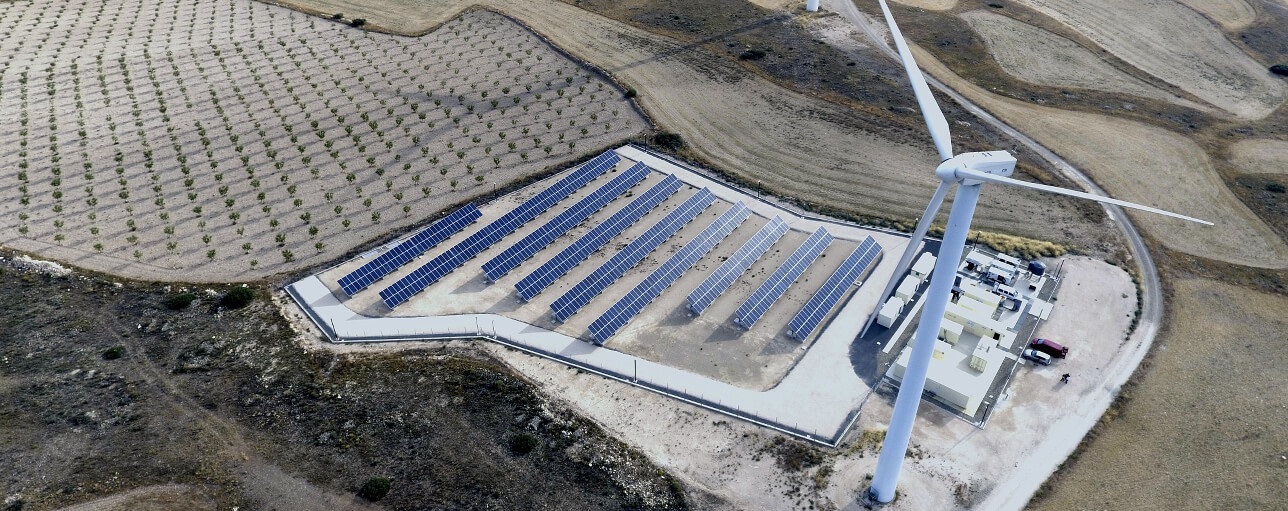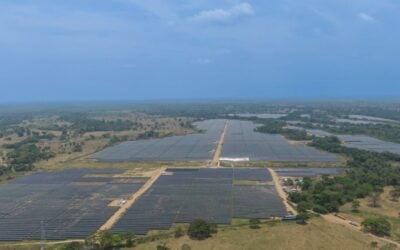
26 February 2021: Siemens Gamesa pilot hybrid project is first to earn grid code compliance certification from DNV GL
A hybrid renewable energy pilot project combining wind and solar generation with battery storage can “supply electricity to the grid in a stable way,” having earned grid compliance certification from DNV GL.
Enjoy 12 months of exclusive analysis
- Regular insight and analysis of the industry’s biggest developments
- In-depth interviews with the industry’s leading figures
- Annual digital subscription to the PV Tech Power journal
- Discounts on Solar Media’s portfolio of events, in-person and virtual
The accreditation and standards group said that the ‘La Plana: Storage, wind and solar’ hybrid power plant project built by Siemens Gamesa in Zaragoza, Spain, is the first recipient of DNV GL’s Type Certificate of grid compliance. After testing, it met requirements to be able to perform various control functions to the grid, as well as meeting grid code requirements.
The project combines an 850kW wind turbine, 245kWp of ground mount solar PV and two types of battery storage: 435kW / 145kWh of lithium-ion and 120kW / 400kWh of redox-flow. It also includes three diesel gensets, each of 222kW, but DNV GL said that the grid code tests assessed the hybrid power plant’s operation without these fossil fuels assets being used.
DNV GL said it has formulated a set of criteria tailored to hybrid power plants, a relatively new class of energy asset. The plant had to prove that it could provide so-called base load energy, as well as peak shaving and smoothing control functions that the battery storage enables La Plana to perform.
Read 'Fine Tuning the hybrid proposition,' a feature article from our quarterly journal PV Tech Power which looks at the technical challenges of hybrid projects, including the La Plana pilot.
25 February 2021: Total picks AI-driven energy platform company AutoGrid for 25MW French project
The delivery of grid-balancing services from Total’s recently-commissioned 25MW / 25MWh battery storage project in Dunkirk, northern France will be managed by AutoGrid’s Flex virtual power plant (VPP) platform.
Currently France’s biggest electrochemical energy storage plant — although it looks set to be overtaken for that crown soon — energy major Total was contracted by grid operator RTE to deliver the battery energy storage system (BESS) and it was announced as in operation earlier this year. The BESS comprises 11x 2.3MWh lithium-ion container solutions made by Total subsidiary Saft.
AutoGrid’s flexible energy management platform suite will be used to run the battery system’s frequency regulation applications, responding to grid signals from RTE to help balance the system in under 500 milliseconds, to participate in the European Frequency Containment Reserve (FCR) market. Total’s venture capital arm is a minority investor in AutoGrid, which was recently tapped by US residential solar and storage installer Sunrun to optimise a fleet of its assets.
Read 'Optimising DERs: Artificial intelligence and the modern grid', a feature article by Rahul Kar, general manager and VP for new energy at AutoGrid.
25 February 2021: EDF wins latest UK battery storage optimisation deal for 80MW
Eelpower, a UK-based energy storage project ‘build-own-operate’ company, has selected utility EDF to trade and optimise three battery storage assets totalling 80MW under a seven-year contract.
The batteries are majority owned by Swiss fund manager SUSI Partners’ Energy Storage Fund, with Eelpower owning the remaining stakes itself. They form part of a broader partnership between the two companies for the development of battery storage, announced in January 2021.
EDF’s Powershift trading platform will be utilised to open revenue streams for the assets, with the French giant working alongside Eelpower’s technology partner Upside Energy. This will include playing the assets in ancillary services, the balancing mechanism and wholesale optimisation.
It follows a slew of optimisation deals signed by EDF in recent months. This includes working with Gresham House Energy Storage Fund to optimise its 50MW Wickham Market battery and optimising SWGT‘s 30MW utility-scale battery. The company is also working to build up its own battery portfolio, investing in cleantech startup PowerUp to support its 10GW of storage by 2035 ambition.
In December, Eelpower selected the trading and optimisation arm of another major utility, Centrica, to optimise a 10MW battery storage project in England.
This story first appeared on Current±. Read the full version here.






